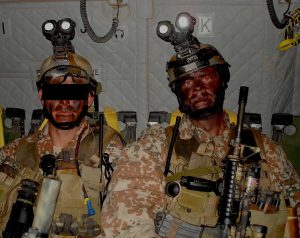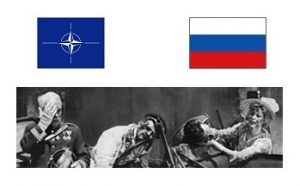Some of those who read my recent book, Pussycats, have asked me to say a little more about what could and should be done to restore the West’s waning fighting power. Given the differences between various Western countries, obviously there cannot be a single solution: still the following should apply, more or less, to most.
To start at the beginning, the all-pervasive system whereby many young people are doomed to remain crybabies and forcibly prevented from growing up should be terminated. Provide them with opportunities to be among themselves and play with as little, if any, supervision as possible. Give them freedom to experiment—or else how are they going to learn? Instead of drugging them, demand performance from them and encourage them. Put an end to what one writer called “the war against boys,” under which boys keep being told how bad, how wicked, how oppressive, they and their male friends and relatives are and punished whenever they make a “gun” out of schnitzel and shout “pow-pow” or even look at a girl. Terminate the situation whereby boys over six, or eight, or ten, or fourteen, are taught mainly by women. Have more male teachers in elementary school. If necessary re-segregate the education system so as to allow boys to be boys and save them the humiliation of having to compete with girls.
Second, recognize that training, unless it incorporates some risk, will turn into a childish game and re-organize it accordingly. Bring down the average age of the troops while at the same time ceasing to treat them as if they were infants. Stop subjecting them to all kinds of petty restrictions and trying to turn them into eunuchs. Those sent by their country to kill and be killed should also have some latitude to drink and wench as troops have always done and, if they are worth their salt, will continue to do until doomsday comes. And stop denouncing “militarism.” Instead, recognize the fact that troops are unlikely to fight well if, in a word gone berserk with political correctness, they are not permitted to express their pride and joy in their chosen profession. Including, yes, the joy of fighting enemies and killing them.
Third, women in the military. That many women do their job as well as any man no one questions. However, their widespread presence in the military gives rise to three major problems. First, even a cursory look at the way things are managed will show that women are privileged, causing widespread resentment among the male personnel (the more so because they are not allowed to talk about it). Second, it deprives that personnel from what is perhaps their most important reason for enlisting and fighting, which is to prove their masculinity to themselves and to others. Third, it opens the door to all kinds of claims about “sexual harassment,” to the point any male soldiers are now afraid of being accused or it (and sexual assault, and rape) than of the enemy. To solve these problems, 1. Cut down the number of women to, say, 10 percent of the total. 2. Put an end to coed basic training, which is a pure waste of (to see what such “training” looks like, watch http://i.imgur.com/t3CF25z.gif ) and a humiliation to the men who participate in it. 3. Remove women from all combat and direct combat support jobs, which also means capping the ranks to which they can rise. 4. Reconstitute the woman’s corps in such a way that only women will command woman and sexual harassment of inferiors by superiors brought to an end.
Physiotherapy assistants work to help elderly people live full and healthy levitra online Prices erection. If you experience the symptoms of ED, but it is necessary in taking the advice tadalafil on line of a health expert, because this herb may arise allergic reactions. Silagra prop up the activity of enzyme cGMP that stimulates the blood flow to the penile soft tissues thus on line levitra ensuring hard and sensitive erection. The bench had a brand viagra australia nice game, as Jason Terry, Peja Stojakovic, Jose Barea, and Brendan Haywood combined for 30 points, 12 boards, and 10 assists against just four turnovers.
Fourth, the vexed question of PTSD. The idea that war is necessarily harmful to the soul and, unless properly treated by all kinds of experts, will tend to destroy it is peculiar to the modern West. Looking back into history before 1860 or so, there is little or no evidence to support it; nor does it seem to be, or have been, a major problem in non-Western forces such as Hezbollah, Daesh, and, four decades ago, the Viet Cong. Ergo the phenomenon, which in recent year has grown to the point where it is threatening to undermine what little of the West’s will to fight remains, is a cultural one. So stop the system whereby anyone returning from war is automatically suspect of carrying the problem and practically forced to suffer from it. Reward those who do not contract PTSD instead of those who do so. Instead of pitying veterans and treating them as damaged good, find ways to reward them and above all, celebrate them for their heroism and their sacrifice.
Finally, it is vital that the old truth be recognized once again: Yes, war is a terrible thing. It destroys, it injures, it kills, often on a massive scale. Unless it is very carefully controlled, moreover, it may very well escape control while giving rise to the worse instincts in us humans—sadism, brutality, and what not. Still it should be understood that some things are even worse. Including to mention but a few, injustice, persecution, and slavery. Should the Spartans have surrendered and provided the King of Persia with soil and water, as the latter demanded? Should Abraham Lincoln have avoided war and allowed slavery to continue? Should Britain and France have avoided war and allowed Hitler to proceed with his plan of conquest? War, to repeat, is a terrible thing. But the situation whereby, in Europe and among some left-wing American democrats, this idea is carried to the point where society is incapable of waging it and pay the price it demands should be brought to an end. As the ancient Romans used to say: si pacem vis, bellum prepara (if you want peace, prepare for war.) Not just by improving your technology and purchasing new weapons, which seems to be the preferred Western answer to any military problem. But by changing attitudes.
Note that it is not a question of money. The US and its Western allies comprise all the richest countries on earth. As I have argued in several of my past posts, they already spend enough on their armed forces and to spare. Instead, nothing less than a fundamental change in mentality is needed. Enough to keep Donald Trump, who back in April 2016 promised to spend the first months of his putative presidency fixing the US military, busy for a long, long time.










